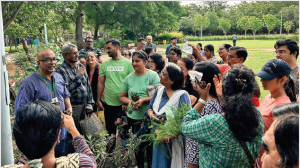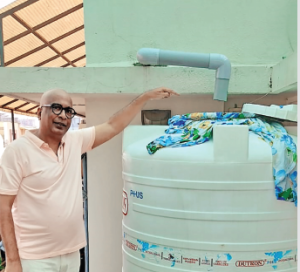For 11 years now, Tree walks, a not-for-profit group, has been working towards raising awareness about nature and its components. From students and greenhorns to horticulturists, urban planners, architects and other professionals, the membership of the group is as diverse as the topics it covers. It is a movement to help people connect with nature, founding member Lokendra Balasaria tells Chitra Nair.
 Picture Courtesy : Ahmedabad Mirror
Picture Courtesy : Ahmedabad Mirror
An idea is what it takes for revolutions to begin. And an idea, born around 11 years ago, is slowly but surely evolving into a green revolution, its base right here in Ahmedabad. For environment lovers in the city, and a few outside, treewalks is not a new name. Founded by architect and urban planner Lokendra Balasaria in 2013 and then revived in 2016, the not-for-profit group has been dedicatedly working towards a healthier natural environment.
Treewalks is a movement to remind people of their connection with nature. It goes beyond conservation of the environment. The idea is to make people understand nature and take them closer to it, says Balasaria.
Birth of the movement
 Picture Courtesy : Ahmedabad Mirror
Picture Courtesy : Ahmedabad Mirror
Natural components like soil, water and plants were part of Balasaria’s professional work. “Over time, probably working with them, I fell in love with them. And then I saw people who did not understand them,” he says, referring to people chopping trees in their gardens and around their homes because “they made the place dirty”.
He decided to initiate a programme where they would walk among trees and tell people about plants, birds, insects, nature, etc. For expert inputs, he got in touch with Asif Memon, a horticulturist who became the general manager of Sabarmati Riverfront Development a few years later. Today, Treewalks has around 1,400 members, besides a few hundreds who follow Balasaria on his social media accounts. The group organises training sessions for new members. Senior members also offer guidance to non-members and groups keen on implementing greener practices in their neighborhoods. Balasaria himself has overseen many a rainwater harvesting and greening project in several cities.
Workshops on plantation, composting, rainwater harvesting and other topics have been organized for institutes, societies and villages.
Treewalks is about giving, says Balasaria, invoking Khalil Gibran’s Prophet. “Our ideology aligns with that of the Prophet. Who are we to decide the eligibility of those created by God? We just give,” he philosophises. People often mistake Treewalks to be a sapling exchange platform, Balasaria tells us. But over time, they realise that it is more than that.
Every time a Treewalks member harvests edibles from the garden, they upload the photos on the group. The sight of those baskets of leaves, flowers, fruits and vegetables can be quite an inspiration.
These days, every time it rains, members upload photos of their rainwater harvesting (RWH) efforts. “Rain is a resource, but we have made it painful, so it brings us pain,” says Balasaria as we move on to the topic of RWH. Thanks to all the knowledge and experience sharing, several members now harvest rainwater in their own way, from filling up pitchers for consumption to installing RWH systems and setting up Khambhati kuva. The discussion instantly veers to Khambhati kuva. “There are three requirements for Khambhati kuva— you need soft earth, not rocky terrain. There should be no shallow water. If you want to dig up to 30 or 40 feet, there should be no water at that level so that rain water can seep into the ground. The third is a sand layer, which will help absorption of huge quantities of water.” Ahmedabad meets all the three requirements, he says. For places that do not have any of these, one can go for rooftop rainwater harvesting, he suggests.
Besides the obvious benefit of tackling flooding issues—thousands of liters per hour can be diverted to the ground by a single Khambhati kuva—the lesser talked about benefit is the improvement in water quality. “The amount of water in shallow aquifers—underground water zone—is several times more than that of surface water. So when we talk about recharging reservoirs, we should also talk about recharging these aquifers. They are empty, let’s fill them up,” says Balasaria. That, he explains, can address several problems. The water level in Kankaria lake, for example, has been declining, because of which Narmada water has to be diverted there. A lot of water is being drawn from borewells in the surrounding areas, because of which water from the lake flows in that direction. “Recharge the ground water and Kankaria will fill up on its own,” says Balasaria. This is the solution he had given to the AMC as well when they approached him. All of his solutions are of this nature—simple.
If the soil health is good, plants will flourish. And it is extremely simple to make good soil. Put three parts crushed leaves, one part compost and one part soil. Add some water and keep it in a bag. In about one and a half months, you will have the best soil in the world, rich in organic carbon that will boost microbe growth which in turn will generate nutrients for the plants.
Ground report
The knowledge-sharing and inspiration on the Treewalks group has resulted in a sea change in the attitude of people, says Balasaria. “Today, there are hundreds of families doing composting and growing healthier plants at home. Many are giving out saplings to others for free. People are celebrating pollinators eating their plants instead of wanting to kill them,” he adds. Treewalkers talk respectfully about plants, even the weeds.
In another 10 to 15 years, there should be no Treewalks, says Balasaria. Everyone should be a Treewalker, this work does not have to be restricted to one group, he says on a parting note.
 Picture Courtesy : Ahmedabad Mirror
Picture Courtesy : Ahmedabad Mirror
The Neerain rooftop rainwater harvesting filter can be a powerful solution to the issues highlighted in the article. By enabling households and communities to collect and filter rainwater directly from rooftops, Neerain helps reduce dependency on unreliable municipal supplies and expensive water tankers. Its patented, maintenance-free design ensures clean, usable water that can be stored for daily use or used to recharge borewells, thus addressing both immediate water needs and long-term groundwater sustainability. In urban areas facing water shortages, widespread adoption of Neerain filters can ease pressure on public infrastructure, empower residents with self-sufficiency, and create a more resilient water ecosystem.
NeeRain is proud to republish this blog to spread awareness about the situation of water, for our stakeholders.
This blog is published by: –
Ahmedabad Mirror
We would like to spread this for the benefit of fellow Indians.
Publish On: 4 Aug 2024
